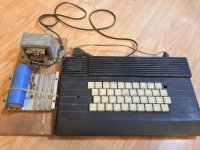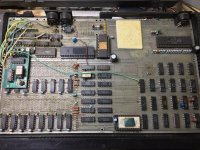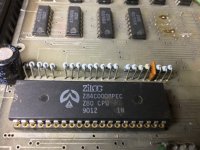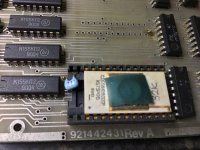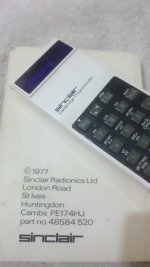Great link, jaycee!
Sinclair Radionics produced Class-D (PWM) amplifiers in kit or assembled form back in 1965.
Sinclair X20
Sinclair Radionics produced Class-D (PWM) amplifiers in kit or assembled form back in 1965.
Sinclair X20
RIP Sir Clive.
Thanks to Sir Clive, I built my first Spectrum 48K compatible computer in 1991, while I was student. It was named Cobra and was very popular along students.
On this machine I learned to code in Basic and enjoyed a plethora of games.
Thanks to Sir Clive, I built my first Spectrum 48K compatible computer in 1991, while I was student. It was named Cobra and was very popular along students.
On this machine I learned to code in Basic and enjoyed a plethora of games.
Attachments
Last edited by a moderator:
Just the other day I was listening to the sound of games ( on you tube ), sat there watching a cassette going around listening to beeebooooeeee for ages. Someone showed some kids a spectrum, and they thought it looked modern all these years later. If the C5 hadn't been a flop ( purely because of other road users) he would have plowed the profits into electric cars, how the world would be different today.
Anyone for a game of thrust ll?
Anyone for a game of thrust ll?
Wow some astonishing links and pictures and other info in these posts.
I too was sad to hear of his passing, other than the C5 disaster, much of his stuff was quite good for the price.
I was already an Assembler Programmer in 1980, on 8-bit processors, Intel 8080/85, then a strange beastie called the RCA 1802, then the fabulous MOS TEC / Rockwell 6502.
Until I started on the 6502, I thought the 8080/85 was the best, until someone told me that registers aren't everything, addressing-modes are king. He was right. I could do far more, in less code, on the 6502 than on the 8080/85.
I had an Acorn Atom at home in 1984, that used the 6502 and was amazing. I never went further at home because I ended up on other projects in companies using the Apple IIe (6502) and the IBM PC (8085).
So (fortunately) I totally skipped the BBC micro (6502) and (lamentably) the ZX Spectrum (Zilog / Mostek Z80 CPU). From what I knew at the time, the Z80 CPU was an improvement on the (relatively rubbish) Intel 8085 with addressing modes comparable with the 6502.
If you never saw it, watch "Micro Men" Micro Men - Wikipedia about the rivalry between Sir Clive Sinclair (played by Alexander Armstrong), who developed the ZX Spectrum, and Chris Curry (played by Martin Freeman), the man behind the BBC Micro. It's on youtube.
But 16 bit came along and it all accelerated with C programming etc, so quickly, so that Assembler Programming became a thing of the past
Anyway, I did actually purchase a Sinclair Product in 1977 - the Sinclair Cambridge Programmable calculator, which was brilliant, and it still works. My picture of my very calculator, on the fabulous book of programmes you could put into it.
I too was sad to hear of his passing, other than the C5 disaster, much of his stuff was quite good for the price.
I was already an Assembler Programmer in 1980, on 8-bit processors, Intel 8080/85, then a strange beastie called the RCA 1802, then the fabulous MOS TEC / Rockwell 6502.
Until I started on the 6502, I thought the 8080/85 was the best, until someone told me that registers aren't everything, addressing-modes are king. He was right. I could do far more, in less code, on the 6502 than on the 8080/85.
I had an Acorn Atom at home in 1984, that used the 6502 and was amazing. I never went further at home because I ended up on other projects in companies using the Apple IIe (6502) and the IBM PC (8085).
So (fortunately) I totally skipped the BBC micro (6502) and (lamentably) the ZX Spectrum (Zilog / Mostek Z80 CPU). From what I knew at the time, the Z80 CPU was an improvement on the (relatively rubbish) Intel 8085 with addressing modes comparable with the 6502.
If you never saw it, watch "Micro Men" Micro Men - Wikipedia about the rivalry between Sir Clive Sinclair (played by Alexander Armstrong), who developed the ZX Spectrum, and Chris Curry (played by Martin Freeman), the man behind the BBC Micro. It's on youtube.
But 16 bit came along and it all accelerated with C programming etc, so quickly, so that Assembler Programming became a thing of the past
Anyway, I did actually purchase a Sinclair Product in 1977 - the Sinclair Cambridge Programmable calculator, which was brilliant, and it still works. My picture of my very calculator, on the fabulous book of programmes you could put into it.
Attachments
I went to a lecture by him at the IEEE centre in London many years ago.
I wrote the software for Teletext on the Sinclair Spectrum in 1983/4.
The Spectrum was an odd beast.
The video memory was split into 3 2k lumps and one attribute memory.
Even the 2k lumps you had to add 256 to get to next line.
In Teletext there are 40 characters per row but Spectrum only had 32 characters.
So I had to bitmap in the 40 characters using bit manipulation.
Had to bodge the colour attributes best I could.
All worked well in the end.
^ in one of those links I found links to two youtube videos
Ruth Bramley - Working at Sinclair Research from 1981 to 1984 , which is 73 minutes, but I found it captivating
Chris Curry talks about Clive Sinclair, Sinclair Radionics and Acorn Computers , which is 52 minutes, also captivating, and in this video they also mention the "Micro Men" TV dramatization (about Curry ending up competing with Sinclair).
There are far worse ways to spend 2 hours of your life than watching those two videos - I didn't do it in one sitting LOL
Ruth Bramley - Working at Sinclair Research from 1981 to 1984 , which is 73 minutes, but I found it captivating
Chris Curry talks about Clive Sinclair, Sinclair Radionics and Acorn Computers , which is 52 minutes, also captivating, and in this video they also mention the "Micro Men" TV dramatization (about Curry ending up competing with Sinclair).
There are far worse ways to spend 2 hours of your life than watching those two videos - I didn't do it in one sitting LOL
- Home
- General Interest
- Everything Else
- Sir Clive Sinclair - RIP
